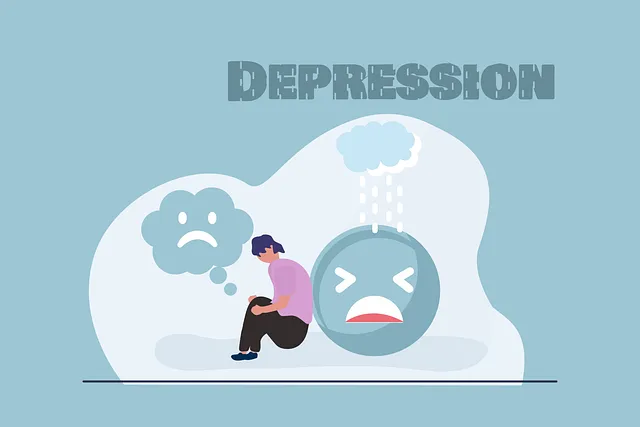Kaiser Permanente's innovative training programs in Castle Rock focus on mental health awareness, stress management, and emotional intelligence to build resilience. Through practical exercises inspired by Mind Over Matter principles, these programs teach effective coping mechanisms, depression prevention, and communication skills, fostering personal growth, better relationships, and improved work performance. The Castle Rock Method combines crisis intervention guidance with mindfulness and cognitive reframing, empowering individuals to handle adversity with mental fortitude. By integrating RFM (Resilience, Flexibility, Mindfulness) principles, Kaiser Permanente's programs enhance emotional well-being and life satisfaction both personally and professionally.
“Uncover the power of Resilience and Frequency Management (RFM) with this comprehensive guide. Explore how organizations like Kaiser Permanente are leveraging RFM to build resilience in their employees, enhancing well-being and performance.
Dive into unique approaches, such as the Castle Rock Method, uncovering practical exercises that foster adaptability. Learn key components of effective training programs and discover real-world applications from successful implementations. By understanding RFM, you’ll unlock strategies to navigate life’s challenges with greater ease.”
- Understanding RFM: An Overview of Resilience and Its Benefits
- Kaiser Permanente's Approach to Training Programs: A Unique Perspective
- The Castle Rock Method: Building Resilience Through Practical Exercises
- Key Components of Effective Resilience Training
- Implementing RFM in Everyday Life: Real-World Applications and Success Stories
Understanding RFM: An Overview of Resilience and Its Benefits

Resilience is a fundamental human capacity to adapt and bounce back from adversity. It’s about more than just getting through tough times; it’s about emerging stronger and with improved coping mechanisms. At Kaiser Permanente training programs in Castle Rock, we recognize that building resilience is an essential aspect of overall well-being. Our exercises focus on nurturing mental health awareness and strengthening individuals’ ability to cope with stress, trauma, or challenging life events.
Through various activities, participants learn effective depression prevention strategies and communication techniques. By fostering a sense of purpose, social connection, and emotional intelligence, these programs empower individuals to navigate life’s curveballs with resilience. The benefits extend far beyond the training halls, positively impacting personal relationships, work performance, and overall quality of life.
Kaiser Permanente's Approach to Training Programs: A Unique Perspective

Kaiser Permanente, a renowned healthcare organization based in Castle Rock, has pioneered an innovative approach to training programs, emphasizing holistic well-being. Their unique perspective goes beyond traditional medical training by integrating Emotional Well-being Promotion Techniques into their core curriculum. This forward-thinking strategy recognizes the intricate link between physical health and emotional regulation, understanding that stress management and social skills training are integral components of overall resilience.
By prioritizing these aspects, Kaiser Permanente’s programs aim to cultivate not just robust physiques but also mentally agile individuals equipped with effective emotional regulation strategies. The organization’s commitment to this multifaceted approach ensures that participants develop essential social skills, fostering better connections and support systems—a key element in building resilience within their communities.
The Castle Rock Method: Building Resilience Through Practical Exercises

The Castle Rock Method is a unique training program developed by Kaiser Permanente, focusing on building resilience through practical exercises inspired by Mind Over Matter Principles. This innovative approach combines Crisis Intervention Guidance with Mental Health Awareness to empower individuals in managing stress and adversity. By engaging in these tailored exercises, participants learn to navigate challenging situations with enhanced emotional agility and mental fortitude.
The program leverages the power of mindfulness, cognitive reframing, and practical coping strategies to equip folks with tools for overcoming obstacles. In a fast-paced world filled with constant demands, The Castle Rock Method offers a much-needed respite, teaching participants how to stand firm in the face of adversity—much like a castle rock, unmoved by external forces. This holistic training is designed to revolutionize personal growth and resilience, fostering a sense of calm and clarity even amidst life’s busiest labyrinths.
Key Components of Effective Resilience Training

Resilience training is a comprehensive process that equips individuals with the tools to navigate life’s challenges and build mental fortitude. When designed effectively, these programs incorporate several key components that foster adaptability and emotional well-being. One of the cornerstones of successful resilience building exercises is teaching conflict resolution techniques. Learning how to manage and de-escalate conflicts promotes healthy communication and reduces stress levels, enabling individuals to handle difficult situations with composure.
Another vital aspect is focusing on self-esteem improvement. Boosting self-confidence allows participants to face setbacks and failures as opportunities for growth rather than personal defeats. Moreover, integrating mood management strategies enables individuals to recognize and regulate their emotional responses, leading to better stress resilience and overall mental health. Kaiser Permanente training programs in Castle Rock have successfully utilized these principles, providing attendees with practical skills that enhance their ability to cope with life’s demands.
Implementing RFM in Everyday Life: Real-World Applications and Success Stories

Implementing RFM—Resilience, Flexibility, and Mindfulness—in everyday life can significantly enhance one’s ability to navigate challenges and foster personal growth. At Kaiser Permanente training programs in Castle Rock, for instance, individuals have successfully integrated RFM principles into their daily routines, leading to improved emotional well-being and enhanced performance. These exercises focus on cultivating resilience by teaching participants how to adapt to change and bounce back from setbacks.
One of the key benefits of RFM is its practical application across various aspects of life. For instance, Emotional Intelligence (EI) techniques, a component of RFM, can improve self-esteem improvement and communication strategies, making interactions with others more productive and positive. Success stories within the Kaiser Permanente training programs highlight how these exercises have empowered individuals to better manage stress, enhance their emotional intelligence, and ultimately achieve greater life satisfaction in both personal and professional spheres.
Resilience is a powerful tool for navigating life’s challenges, and the combination of RFM (an acronym for a unique approach to resilience building) with practical exercises offers a compelling framework. As demonstrated by Kaiser Permanente’s successful training programs and the Castle Rock Method, integrating these strategies into everyday life can foster adaptability, enhance well-being, and provide individuals with the tools to thrive in various contexts. By focusing on key components such as mindset shifts, emotional regulation, and practical skill-building, people can empower themselves to face adversity head-on and emerge stronger. This holistic approach, backed by real-world applications, underscores the potential of RFM to revolutionize personal growth and resilience.






